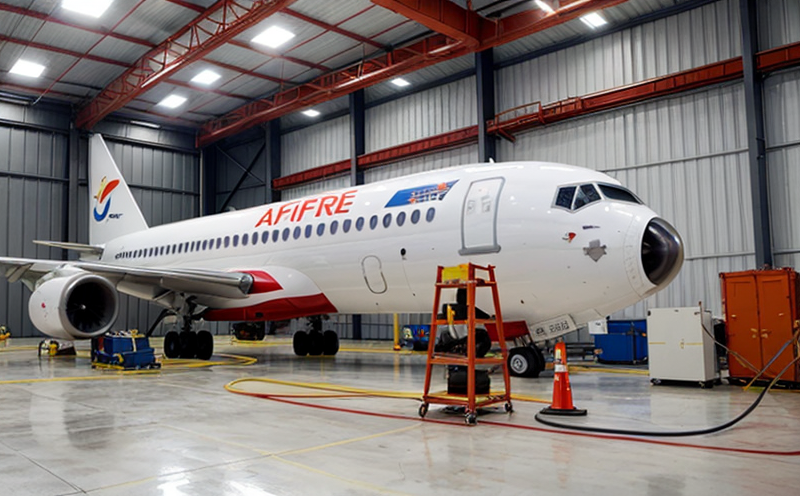Flammability Assessment of Aircraft Plastic Moldings
The flammability assessment of aircraft plastic moldings is a critical aspect of aerospace fire safety testing. Ensuring that materials used in the manufacturing process are safe and meet stringent standards is paramount to preventing potential hazards during flight operations. This service involves comprehensive evaluation processes aimed at identifying any risks associated with the combustion behavior of these materials.
Our approach begins by selecting appropriate specimens from the plastic moldings under consideration, taking care to follow precise guidelines set forth in relevant international standards such as ASTM D635.
- Aerospace-grade polycarbonate (PC)
- Polyetherimide (PEI) and its derivatives
- Polymethyl methacrylate (PMMA)
The testing environment is meticulously controlled to simulate real-world conditions as closely as possible. Factors like temperature, humidity, and oxygen concentration are carefully managed during the process.
Once prepared, samples undergo various tests designed to measure their resistance against ignition, including but not limited to:
- Vertical flame test (ASTM D6472)
- Halogenated smoke density test
- Oxygen index determination
Each test provides valuable insights into the material's behavior when exposed to flames, allowing us to assess its potential for spreading fire. Results are analyzed thoroughly before being reported back to clients in clear, actionable terms.
In addition to these tests, we also employ advanced analytical techniques such as thermogravimetric analysis (TGA) and differential scanning calorimetry (DSC). These methods help us understand more about the thermal stability of the materials being tested. Understanding how they react under different temperatures can provide crucial information regarding their suitability for use in aircraft interiors.
Our team of experts ensures that all aspects of this service are conducted according to best practices and current regulatory requirements. By leveraging our state-of-the-art facilities and experienced personnel, we offer reliable assessments that contribute significantly towards enhancing overall safety standards within the aviation industry.
Applied Standards
The aerospace sector operates under rigorous global regulations aimed at ensuring passenger safety above all else. To this end, several internationally recognized standards govern fire safety testing for materials used in aircraft manufacturing:
- ASTM D635: Specification for Polyurethane Foams for Use in Aircraft Seating and Padding Applications.
- ASTM D6472: Standard Test Method for Evaluating Combustion Characteristics of Polymers Using a Cone Ignition Apparatus.
- IEC 60695-11-1: Particular requirements for the safety of electrical equipment in potentially flammable atmospheres – Flammability tests on materials used in equipment and components intended to be used in potentially explosive atmospheres.
- IIS 302.4: Standard Practice for Evaluating Combustion Characteristics Using a Cone Ignition Apparatus.
These standards provide clear guidelines that guide our testing procedures ensuring accuracy and consistency across all projects undertaken by our laboratory.
Industry Applications
| Application | Description |
|---|---|
| Aircraft Interior Materials | Testing for compliance with FAA regulations and other international standards. |
| Molded Plastics in Aircraft Structures | Evaluating the flammability characteristics to ensure structural integrity during emergencies. |
| Seat Cushions & Backrests | Ensuring they meet strict flammability requirements set by aviation authorities worldwide. |
- Molded plastics used in aircraft interiors must pass rigorous flame tests to ensure they do not contribute to the spread of fire during an emergency situation.
- Materials like polycarbonate and polyetherimide, which are common in modern aircraft seating solutions, need careful evaluation due to their high heat deflection temperatures.
The results from these assessments play a vital role in shaping design decisions made by manufacturers. They help prioritize areas where improvements can be made while minimizing any risks associated with the use of certain materials.
Customer Impact and Satisfaction
By providing accurate, reliable flammability assessments, we contribute directly to improving passenger safety in commercial aviation. Our clients benefit from this service through several key ways:
- Informed Decision Making: Detailed reports enable manufacturers to make informed choices about material selection.
- Regulatory Compliance: Ensures that products meet all necessary regulatory requirements, avoiding costly delays or recalls later on.
- Enhanced Reputation: Demonstrating a commitment to safety builds trust with stakeholders and the public alike.
We pride ourselves on delivering top-notch service backed by years of experience in aerospace fire safety testing. Our clients consistently rate us highly for our professionalism, attention to detail, and ability to deliver results quickly yet accurately.
Aerospace companies have come to rely on us as a trusted partner when it comes to ensuring their products meet all necessary standards. With every project completed successfully, we continue to build upon that reputation by providing exceptional service tailored specifically to each client's needs.





